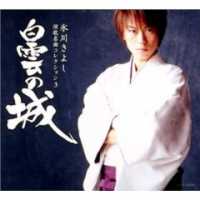Kiyoshi Hikawa (氷川 きよし Hikawa Kiyoshi?) is a Japanese enka singer who was born on September 6, 1977 in Minami-ku, Fukuoka, Fukuoka Prefecture, Japan.[1] His real name Kiyoshi Yamada (山田 清志 Yamada Kiyoshi?)[1] and he is known as "The Prince of Enka" due to his young age and popularity. When he is marketing non-enka music, he goes by KIYOSHI, using capitalized letters of the roman alphabet, instead of kanji and hiragana.
His record company is Columbia Music Entertainment, and his agency is Nagara Productions. He was given his stage name by Takeshi Kitano,[1] who initially supported his career. Today, Hikawa makes frequest appearances on NHK Kayō Concert (NHK歌謡コンサート?), as well as NHK's Kōhaku Uta Gassen.Contents [hide] 1 History 2 Characteristics 3 World-wide exposure 4 Discography 4.1 Singles 4.2 Albums 4.2.1 Mini albums 4.2.2 Full albums 5 Trivia 6 External links 7 References
[edit] History
As a high school student, Hikawa was a member of the school's performing arts club (芸能部 geinō-bu) and trained to be a singer. It is unusual for a young person in his 20s to take up the style of enka professionally, as most enka fans prefer their performers to be much older. Hikawa decided to become an enka singer when he found that his singing of traditional songs had an effect on the residents of the nursing homes he visited. After graduation from high school in 1995, Hikawa travelled to Tokyo, where he became an apprentice under the supervision of Hideo Mizumori. He served under Mizumori for three years.
In 2000, Hikawa made his professional debut with his single "Hakone Hachiri no Hanjirō."[2]
Hikawa released single "Hatsukoi Ressha" on February 9, 2005. It became his first number-one single on the Japanese Oricon weekly single charts. In 2006, he won the grand prix award by his song "Ikken" at the 48th Japan Record Awards. On February 4, 2009, he released single "Rōkyōku Ichidai", which became his second number-one single on the Oricon weekly charts. On May 20, 2009, he released album Enka Meikyoku Collection 10 Rōkyōku Ichidai, which debuted at #2 on the Oricon weekly album charts only behind Eminem's album Relapse. He released his second single of the year, "Tokimeki no Rumba", on August 19, 2009. The single debuted at #1 on the Oricon weekly charts with the first week sales of about 68,000 copies, making him the first solo enka singer to make three number-one singles in Oricon history.[3] He released album Enka Meikyoku Collection 11 Tokimeki no Rumba on November 11, 2009.
[edit]
Characteristics
Hikawa is popular with young and old people alike. Although enka is in a downward trend in Japan, Hikawa is responsible for poularizing enka amongst the 20s demographic, who traditionally do not listen to enka. Regularly in his public appearances, Hikawa dresses in trendy clothes one would normally see worn by male Japanese pop stars. In certain segments where he sings traditional-styled enka, he appears in the more traditional kimono normally worn by enka singers. [edit] World-wide exposure
Hikawa has traveled around the world, including to the United States. In 2003, he was the guest of honor at Hawaii's week-long Aloha Festival, where he participated in a parade with various Japan-based hula halau, and ended the week with a concert.
[edit]
Discography
[edit]
Singles
"Hakone Hachiri no Hanjirō" (箱根八里の半次郎?, February 2, 2000) #11
"Ōi Okkake Otojirō Seishunhen" (大井追っかけ音次郎青春編?, February 21, 2001) #8
"Kiyoshi Kono Yoru" (きよしこの夜?, November 21, 2001) #14
"Kiyoshi no Zundoko Bushi" (きよしのズンドコ節?, February 6, 2002) #5
"Hoshizora no Akiko" (星空の秋子?, August 21, 2002) #3
"Hakkun no Shiro" (白雲の城?, February 19, 2003) #3
"Kiyoshi no Dodonpa" (きよしのドドンパ?, January 21, 2004) #4
"Banba no Chūtarō" (番場の忠太郎?, July 7, 2004) #2
"Hatsukoi Ressha" (初恋列車?, February 9, 2005) #1
"Omokoge no Miyako" (面影の都?, July 6, 2005) #2
"Ikken" (一剣?, March 3, 2006) #2
"Abayo" (あばよ?, May 9, 2007) #2
"Kiyoshi no Sōran Bushi" (きよしのソーラン節?, May 9, 2007) #3
"Genkai Funauta" (玄海船歌?, February 13, 2008) #2
"Aishū no Mizuumi" (哀愁の湖?, October 1, 2008) #4
"Rōkyōku Ichidai" (浪曲一代?, February 4, 2009) #1
"Tokimeki no Rumba" (ときめきのルンバ?, August 19, 2009) #1
[edit]
Albums
[edit]
Mini albums
Matatabi Enka Meikyokusen (股旅演歌名曲選?, June 21, 2000)
Matatabi Enka Meikyokusen II / Hakone Hachiri no Hanjirō (股旅演歌名曲選II/箱根八里の半次郎?, October 21, 2000) #68
Ōi Okkake Otojirō (大井追っかけ音次郎?, November 21, 2001) #30
[edit]
Full albums
Enka Meikyoku Collection Ōi Okkake Otojirō Seishunhen (演歌名曲コレクション 大井追っかけ音次郎青春編?, June 21, 2001) #6
Jikiden Original Karaoke (直伝オリジナルカラオケ?, June 21, 2001)
Enka Meikyoku Collection 2 Kiyoshi no Zundoko Bushi (演歌名曲コレクション2~きよしのズンドコ節?, May 22, 2002) #8
Ginga 星空の秋子Hoshizora no Akiko (銀河?, November 22, 2002) #6
Enka Meikyoku Collection 3 白雲の城Hakkun no Shiro (演歌名曲コレクション3?, May 21, 2003) #4
Otokogi (男気?, November 19, 2003) #7
Enka Meikyoku Collection 4 Banba no Chūtarō (演歌名曲コレクション4 番場の忠太郎?, September 1, 2004) #5
Enka Meikyoku Collection 5 Hatsukoi Ressha (演歌名曲コレクション5 初恋列車?, May 18, 2005) #2
Enka Jūniban Shōbu! 面影の都Omokoge no Miyako (演歌十二番勝負!?, November 23, 2005) #5
Enka Meikyoku Collection 6 一剣Ikken (演歌名曲コレクション6?, June 28, 2006) #5
Enka Meikyoku Collection 7 あばよ・きよしのソーラン節Abayo, Kiyoshi no Sōran Bushi (演歌名曲コレクション7?, September 19, 2007) #2
Enka Meikyoku Collection 8 玄海船歌Genkai Funauta (演歌名曲コレクション8?, May 21, 2008) #2
Enka Meikyoku Collection 9 哀愁の湖Aishū no Mizuumi (演歌名曲コレクション9?, December 10, 2008) #4
Enka Meikyoku Collection 10 浪曲一代Rōkyōku Ichidai (演歌名曲コレクション10?, May 20, 2009) #2
Enka Meikyoku Collection 11 ときめきのルンバ~?, November 11, 2009) #2
[edit]
Trivia
KIYOSHI sang the theme song Mirai for the Ultraman Mebius & Ultraman Brothers movie.
The British Japanese culture show, Japanorama used the song Kiyoshi no Zundoko Bushi as an opening theme.
The single Kiyoshi no Zundoko Bushi was parodied in Episode 12 of the Japanese anime series Honey and Clover when Morita does a cherry blossom enka performance complete in the proper attire of Kiyoshi Hikawa.Tokimeki no Rumba (演歌名曲コレクション11
